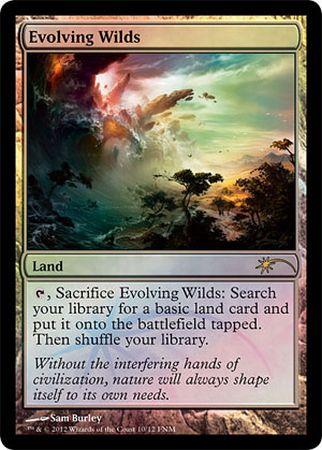There I stood over the glass case looking at all the expensive, rare Magic cards with my friends flanked on both shoulders. I had only been playing for a short time and I was excited to be at my first game store to look for new cards. As I looked into the case, I noticed the fetch lands and the price tag associated with them. “$15?!
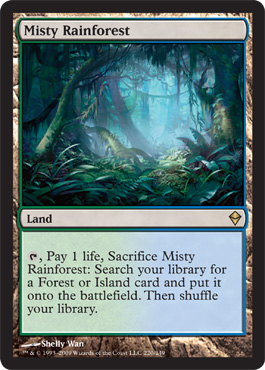
Why would you ever play that over evolving wilds”, I stood exclaiming to my friends. One of the guys flanking my shoulder went on to describe all the reasons why you would want these rare lands over the common land. Today I will be describing a couple of those beneficial reasons that I learned then, and through countless games of playing with them, so we can all understand together why these lands are so powerful and worth the price tag.
The first, and most obvious reason, is that fetch lands can get you duel lands that have the land type on them, i.e. Sacred Foundry or Volcanic Island. Because the wording on a fetch land says “search for an island or mountain”, you can get any land that has the type mountain or island. This allows you to search for either a Sacred Foundry, or a Volcanic Island, with a Scalding Tarn. This gives you access to any type of mana that you need in a given turn, and why we see the interaction so much in eternal formats like Legacy and Modern. Evolving Wilds doesn’t allow for this because of the clause “search for a basic land.” This really limits the uses of Evolving Wilds in multi-colored decks.
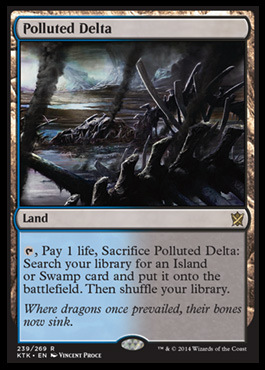
This is all fine and dandy for formats with that interaction, but what about formats without those duel lands? My second point I want to make is that fetch lands put them into play untapped, whereas Evolving Wilds doesn’t. This is the biggest drawback for our good friend the common land. When you construct a deck that wants to play a spell on turn 1, then 2, then 3, and so forth, you need the right colored mana at the appropriate time. Evolving Wilds will always put them into play tapped, and that can disrupt a turn where you needed to cast a very important spell to get you back into the game. Those moments can be the difference between a loss and a win, and it comes up more frequently than you would expect at first glance.
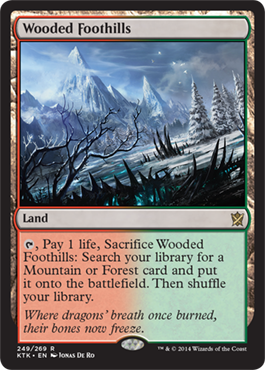
My last major point, and one that doesn’t come up as often as the previous two, is that fetch lands allow you to search at any time, where evolving wilds forces you to search at improper times. How is that possible? What does that mean? Let’s take this scenario. You are sitting with Courser of Kruphix in play with 5 lands accommodating your mana base. You see a 6 drop on top of your deck that you really want to play next turn and need to play your 6th land this turn. Do you play Evolving Wilds or a fetch land? The problem here is that you can’t crack the land until after you draw the card. If you search with an Evolving Wilds on your turn after you draw, you won’t have the 6th land untapped (assuming you have no other lands in hand). If you do it before you draw your card, you will have to shuffle your library BEFORE you draw the 6 mana spell and thus lose the opportunity to draw it. The fetch land allows you to avoid this problem because you can just search after you draw the 6 mana spell. While this play doesn’t come up every game, you will lose percentage points on your ability to win when the problem arises.
I’ve talked about some of the cases where fetch lands are better, but what about the drawbacks? There are a couple of drawbacks that look like a problem for fetch lands, but in reality they won’t hurt as often as Evolving Wilds. First, there is the life loss. Paying one life can be relevant against aggressive decks and when you get low in life total; however, this problem isn’t as bad as not being able to cast your spells on time. If my option was to pay life to be able to cast my removal spell, or to wait a turn and take 2-3 damage more, you better believe I’m paying the life. We saw this in the previous standard format where sometimes you have to pay two life on the shock land, (the duel lands in Return to Ravnica), in order to be able to cast an important spell that turn. Life is a resource that is expendable until you’re out of it. Use it wisely to get ahead on the board rather than fall behind.
What about three colored decks? Don’t they want more options for when they search for a land? In general, the answer is no to this question. Three colored decks don’t need to have the ability to search all three colors as much as they need their lands to come into play untapped. You will also get enough fetch lands in the color combination of your choice to overcome the use of Evolving Wilds. Do yourself a favor and play the fetch land of the appropriate mana to be able to fetch lands that you need on time, rather than waiting a turn to cast your spells. If your mana base is failing you, it’s more likely the other lands that you have in your deck rather than the lack of being able to fetch the 3rd color off that Evolving Wilds you were thinking of playing.
Are there any situations you want evolving wilds? Yes, 4-5 colored decks. I wouldn’t play many Evolving Wilds in these decks, but sometimes you need access to search for any land type in your deck.
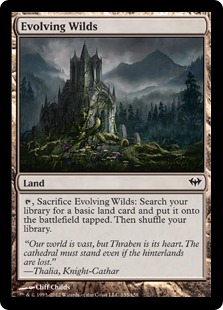
An extremely colorful deck will have more powerful spells than a less colorful one, and because of that you need to be able to cast them, even if it’s a turn late. A couple of Evolving Wilds could sure up your mana, but don’t go overboard on playing a ton of them due to the drawbacks listed above.
I hope this helps to explain why fetch lands can be worth the extra cash you spend on them as opposed to the cheaper alternative. Not everyone will have the extra money to be able to invest in them, but if you do want to improve your decks I recommend fetch lands because of the power level that they bring to your mana base and its utility in older formats.
Thanks for reading,
-Grant Little
